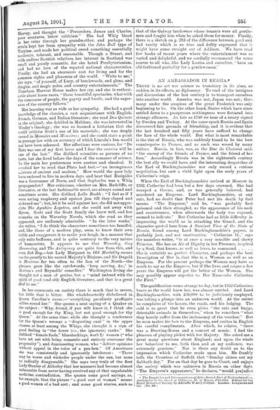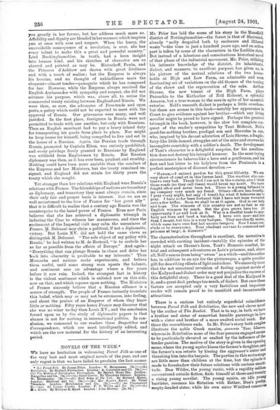AN AMBASSADOR IN RUSSIA.* THERE is no art nor science
so transitory in its aims, so sudden in its effects, as diplomacy. To read of the intrigues and discussions of the last century is to transport ourselves into another world. America was not, Japan was not ; Ger-, many under the auspices of the great Frederick was only beginning to be. On the other hand, States which have since settled down to a prosperous nothingness were flattered into strange alliances. As late as 1740 we hear of a treaty signed by Sweden and Turkey. At the same epoch Russia and Spain discovered fair grounds of friendship, and it is evident that the last hundred and fifty years have sufficed to change the face of the whole world. But what is most remarkable is the rise of Russia, who was suddenly found to be the beat counterpoise to France, and as such was wooed by many suitors. Russia, in fact, was, as the Due de Choiseul said, "the enemy of the friends of France, and the friend of her foes." Accordingly Russia was in the eighteenth century the best ally we could have, and the interesting despatches of the Earl of Buckinghamshire not only record a curious negotiation, but cast a vivid light upon the early years of Catherine's reign.
When the Earl of Buckinghamshire arrived at Moscow in 1762, Catherine had been but a few days crowned. She had usurped a throne, and, as was generally believed, bad murdered an Emperor. Lord Buckinghamshire, at any rate, had no doubt that Peter had met his death by foul means. " The Emperor," said he, " was probably first poisoned and then strangled, as the appearance of his neck and countenance, when afterwards the body was exposed, seemed to indicate." But Catherine had as little difficulty in impressing the world as in attaching the Guard, and the character quoted here from A Succinct View of the State of Russia, found among Lord Buckinghamshire's papers, is probably just, and not unattractive. " Catherine IL," says the nameless writer, "is at once a very sensible and showy Princess. She has an Air of Dignity in her Presence, inspired by a Soul, that knows, as well as loves, to command She is certainly no perfect Character, and perhaps the best Description of Her is, that She is a Woman as well as an Empress. For the present perhaps the Woman may have as much to say as the Empress, but if She lives and reigns a few years the Empress will get the better of the Woman. She may possibly appear superior to Her Namesake Catherine the First."
The qualification seems strange to-day, but in 1762 Catherine, brave as the world knew her, was almost untried. And Lord - Buckinghamshire, with 250,000 to be judiciously employed, was taking a plunge into an unknown world. At the outset he complains of the horses, the roads, and his lodging. The cold is so great that he even pities "the rats and buggy, detestable animals in themselves," when he considers " what they hourly suffer from the inclemency of the weather.". But he soon makes his bow to the Empress, and recites in. English his careful compliments. After which, he relates, " there was a Drawing-Room and a concert of music. I had the pleasure of playing picket with her Majesty. She asked me a great many questions about England; and upon the whole her behaviour to me, both then and at my audience, was extremely gracious." Nor is there any doubt as to the impression which Catherine made upon him. He frankly tells the Countess of Suffolk that "Sunday shines out my Sabbath day." For on that day he goes to Court, and enjoys the society which was unknown in Russia on other days. " The Empress's appearance," he declares, "would prejudice • The Rematches and Correspondence of John, Second Earl of Ituchinghanashire, Ainbaseador to the-. Court of Catherine II. of Russia, 27u2-1765. Edited for the Royal llistorical Society by Adelaide D'Arcy Collyer. London: Lourmans and flOn. 6d.-1
you greatly in her favour, but her address much more so. Affability and dignity are blended in her manner, which inspires you at once with ease and respect. When the hurry, the unavoidable consequence of a revolution, is over, she has every talent to make this a great and powerful country." Lord Buckinghamshire, in truth, lad a keen insight into human kind, and his sketches of character are as shrewd and pointed as may be. Bistucheff, Panin, and the Princess d'Ashkow are drawn with great liveliness and with a touch of malice ; but the Empress is always his heroine, and no thought of unkindliness mars the eloquent—almost tender—panegyric which he has composed for her. However, while the Empress always received the English Ambassador with sympathy and respect, she did not advance his purpose, which was, above all, to revise the commercial treaty existing between England and Russia. We were then, as now, the advocates of Free-trade and open ports, a policy which could not be expected to meet with the approval of Russia. Our grievances were many, and well justified. In the first place, foreigners in Russia were not permitted to trade with one another, but only with Russians.
Then an English merchant had to pay a heavy inland duty for transporting his goods from place to place. Nor might be keep house for himself, being compelled to live and eat in the house of a Russian. Again, the Persian trade through Russia, promoted by Captain Elton, was entirely prohibited, and every privilege freely granted to Russians by England was withheld from Englishmen by Russia. But Russian diplomacy was then, as it has ever been, prudent and stealthy.
Nothing could have been more amiable than the conduct of the Empress and her Ministers, but the treaty remained un- signed, and England did not attain for thirty years the treaty which she sought.
Yet stranger than her relations with England were Russia's relations with France. The friendships of nations are transitory as diplomacy, and transitory they must always remain, since their only fair and proper basis is interest. But we are so well accustomed to the love of France for "her great ally " that it is difficult to realise that a century ago Russia was the counterpoise to the hated power of France. Even now Paris believes that she has achieved a diplomatic triumph in inducing: the Czar to witness her manoeuvres, and since the excitement of the Imperial visit may calm the uneasiness of France, Ili. Delcasse may claim a political, if not a diplomatic, victory. But Louis XV. did not hold the same views as distinguish M. Delcasse. " The sole object of my policy with Russia," he had written to M. de Breteuil, " is to seclude her as far as possible from the affairs of Europe." And again : "Everything that can plunge Russia in chaos and drive her back into .obscurity is profitable to my interests." Thus Monarchs and nations make experiments, and believe them useful, until some strong man upsets the balance, and sentiment sees an advantage where a few years before it saw ruin. Indeed, the strangest fact in history is the violent sentiment which is enlisted now on this side, now on that, and which reposes upon nothing. The Ministers of France sincerely believe that a Russian alliance is a source of strength. The people of France instantly translate this belief, which may or may not be erroneous, into feeling, and shout the praises of an Emperor of whom they know little or nothing. Fifty years hence France may discover that she was no wiser to-day than Louis XV., and the conclusion forced upon us by the study of diplomatic papers is that chance is not for nothing in international politics. In con- clusion, we commend to our readers these Despatches and Correspondence, which are most intelligently edited, and which are the raw material for the history of an interesting period.



































 Previous page
Previous page